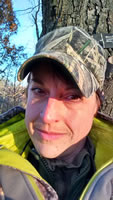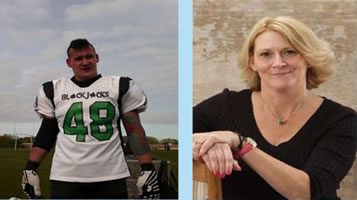Donor Family Stories
Connie Scheochert - Tissue Recipient

To Connie Schoechert, the orange dot on her driver’s license symbolized her pledge to donate organs. But years later, she learned first-hand that donation isn’t limited to the heart, lungs, kidneys, liver and pancreas.
Special gifts she received after two workplace accidents changed her life. They also helped increase her awareness of how the donation of tissue – bone, skin, valves, veins and tendons – can improve strength, mobility and independence for patients in need.
In 1994 while working at a paper mill, Connie slipped on some steps and fell, injuring her right leg. The company nurse said the impact separated the muscle from her femur and would take some time to heal. But healing didn’t come.
Over the next two years, she experienced pain and difficulty walking, despite regular rounds of ultrasounds, physical therapy and home exercises.
Finally, Connie was diagnosed with chondroblastoma, a rare benign bone tumor that required surgery to remove. She was surprised to find out that small bone fragments were used to replace her damaged tissue, thanks to the generosity of a deceased donor.
“That really changed my idea of a donor,” Connie says. “It’s amazing that so many things can be used to make someone’s life better.”
Her experience with tissue donation didn’t end there. In 1999, Connie, now working at a dry cleaner, fell victim to another accident. A press malfunctioned and pinned her left arm, badly burning her skin from the back of her hand to her elbow.
Connie once again found out about the healing power of tissue donation. Over the next year, she received two grafts to repair and restore the scars on her arm – one from her own skin and the other from donor skin.
Today, Connie lives a healthy lifestyle in Nekoosa, Wis., and enjoys hunting, fishing, snowshoeing and biking. She also is serious about fitness and adheres to a low-carbohydrate diet.
She says the journey was challenging and a lot of hard work. And she is grateful to those whose gifts helped her get her life back. “I haven’t received a lung. I haven’t received a heart” she says. “But the little stuff really makes a difference. The quality of life is still there.”
What would she say to her donors? “A million times, thank you,” she says. “Thank you for the selfless act, for the little miracles that happen every single day.”
According to the Donate Life organization, each year there are approximately 30,000 tissue donors and more than a million tissue transplants. The need for donated tissue is steadily rising. While one organ donor can save as many as eight lives, one tissue donor can enhance and heal the lives of more than 75 people.
Donor Family Stories
Patrick Foster - Tissue Recipient

When Cathi Foster was six months pregnant, she learned her baby would be born with a congenital heart defect. Three days after her son Patrick arrived, surgery patched a hole between two chambers of his heart and widened two sections of his pulmonary artery.
There was more stressful news 15 months later: Patrick suffered from Diamond Blackfan Anemia, a rare bone marrow disorder Cathi unknowingly carried. The years that followed were punctuated by blood transfusions and steroid treatments. Still, the outlook was bleak.
“We were told he wouldn’t get past six years old, he would be short in stature and mentally handicapped,” Cathi recalls. But Patrick surprised them all.
At 16, Patrick stands 5-feet-eight inches tall and is looking ahead to college.
A turning point came in 2015 when he received a donated heart valve to further repair and strengthen his cardiac function. Six months after the surgery, his health improved, and he grew six inches. “He is doing phenomenal,” Cathi says. “He’s healthier than some of his peers.”
Cathi says she was astonished the heart valve Patrick received was human, not artificial. She thought about the donor, the donor family and the generous gift her son had received. She wondered if additional information was possible and whether they could meet the donor family.
The donor family preferred not to meet, instead sending a letter to the Fosters. It read, in part, “We are grateful that we had 45 years with [our son]. He was very loving and generous. He had many friends and family members who remember him that way. It makes us happy to know that Patrick and his family can live a more normal life with one part of [our son] working for him.”
The Fosters are thankful for the donor family’s strength and courage in consenting to donation and hope one day to meet the family whose son gave Patrick the gift of life through donation.
Although Patrick can’t tell them in person, “I want them to understand I deeply, deeply appreciate it,” he says. “I’m glad they were willing to say ‘yes’ and do that for me. I can’t imagine how hard that had to be.”
In addition to preparing for Kuyper College in Michigan—with plans to become a youth minister—Patrick has been living life to the fullest. He visited Vietnam for 10 days as part of a church group, helping Vietnamese youth with English and honing their soccer skills. He also has raised $20,000 on behalf of the Children’s Miracle Network and advocates for donation whenever he can.
“I want to give hope to other people,” he says. “I’m super grateful for donation. It has kept me going.”
For more information on Patrick’s journey, take a look at “Patrick’s Fight With DBA,” his special blog on Facebook.
You can help make a difference through the gift of donation. One donor can save or improve the lives of more than 75 people.
Consent to organ and tissue donation by:
- Registering online at your state registry
- Registering online at DonateLifeWisconsin.org (For Wisconsin Residents).
- Registering at the DMV when you apply or renew a driver's license or state I.D. card
- Specifying donation wishes in your Advanced Directive for Health Care (advise your family of your decision).

Wisconsinites now have a new way to support organ, eye and tissue donation via the new Donate Life license plate. Funds will go to support the new online donor registry, opening in April 2010.
- Donate Life Wisconsin license plates can feature regular numbers or a personalized message.
- A $25 tax-deductible contribution to Donate Life Wisconsin is required to issue and renew your plates each year, in addition to the regular registration fee. The $25 contribution may be tax deductible if you itemize your income tax returns.
- A $15 issuance fee is required when non-personalized Donate Life Wisconsin plates are issued.
- A $15 fee is required EACH year in addition to the regular annual registration fee and $25 contribution for personalized plates.
- If the vehicle receiving Donate Life Wisconsin license plates is already titled/registered in your name, complete the vehicle section on form MV2956.
- If the vehicle is not titled in your name, complete the title application form MV1 (401 KB) and form MV2956. Send them with all the required documents and fees to the address on form MV2956.
- Plates may be transferred from an auto to a truck or vice versa upon payment of the full registration fee.
To obtain forms and learn more, visit:
http://www.dot.wisconsin.gov/drivers/vehicles/personal/special/donatelife.htm.
Donor Family Stories
Joshua Richards

Jackie Pische knew that her son, Joshua Richards, had signed up to be an organ and tissue donor when he received his driver's license at age 16. "If you knew him at all, then you would know that this wasn't much of a decision for him. He was always one to give," said Jackie.
In the early morning hours of December 8, 2013, Jackie and her husband, Mike, were awakened to the news that 25-year-old Josh had been critically injured by a gunshot wound to the head. Despite all the efforts of the emergency and hospital staff, Jackie lost her beloved son and friend. According to Jackie, Josh had been a gifted athlete and was in excellent physical shape.
"Seven people were immediately gifted with Josh's organs and tissue," she stated. "Many more are sure to benefit from his generous decision in the years to come. As it turns out, I already have."
Only five days before Josh died, Jackie had been in the same hospital for spinal surgery to help her chronic back pain. Like Josh, she loved to play sports, ride horses, and be outdoors, and she wanted to get back to these activities. Unfortunately, her first procedure did not relieve her symptoms, and the pain and numbness increasingly worsened. A second procedure was needed which required tissue from a donor.
In between the two procedures, Jackie, her family and a few of Josh's friend started a foundation to raise funds and awareness of the importance of organ, tissue and eye donation. She became so involved with the foundation that she delayed her surgery twice. Jackie noted that, "I finally settled on a date in August, which turned out to be a great decision."
"Before my surgery, I was able to connect with representatives of the American Tissue Services Foundation (ATSF) at a Donate Life flag-raising event at the hospital where Josh and I had been treated," she recalled. "Sort of off-the-cuff, I asked if any of Josh's tissue could be used for my procedure. A few weeks later, they told me that Josh's tissue was ready and waiting for me, thanks to Medtronic Spinal. On August 27, 2014, I had the second surgery."
Jackie remembers her son with great love and pride. "Josh is my beloved son and despite his death he will always be with me and I with him, she said, "To be given the privilege of having his tissue help me in my surgery and recovery is an honor, and I will be eternally grateful to ATSF and Medtronic. Josh was an amazing individual and as his mom, I am so very proud of the way he conducted his life and how he made such selfless decisions, especially to be an organ and tissue donor."
Education and Resources
We are committed to providing as much information as possible about how you can rebuild lives through tissue donation, transplantation and making informed donation decisions.
We actively participate in increasing public awareness of organ, tissue and eye donation. We sponsor or take part in donor family recognition and memorial events to honor tissue donor families. We also partner with many other organizations that offer support to grieving families.

Her background includes 27 years of healthcare management, with the last eight years working in hospital and community education, and development, with regard to Tissue Donation and with grieving donor families. She is a member in Donate Life Wisconsin and was the co-chair of the Family Remembrance Event for the National Kidney Foundation Capital City 5K Run/Walk held in Madison for 2012 & 2013.
Jeanette is also an active member of the Association for Death Education and Counseling (ADEC) and achieved a professional ADEC certification and designation of CT – Certified in Thanatology – the study of death, dying, grief and bereavement. Outside of her work with donation, Jeanette is also a Vice President of Support Services for Prevent Suicide Fox Cities – which focuses on community education, suicide prevention and survivor support. She became a trained facilitator for suicide prevention (QPR) and suicide support group services through the American Foundation for Suicide Prevention in summer 2012.
In May, 2012 Jeanette M. Potts earned a Master of Science degree in Leadership with a concentration in Grief and Bereavement. She also holds a bachelors degree in management and communications, and has worked with Wisconsin tissue donor families since 2006.
